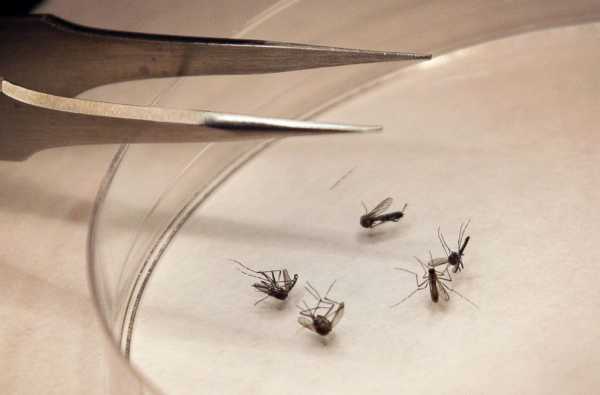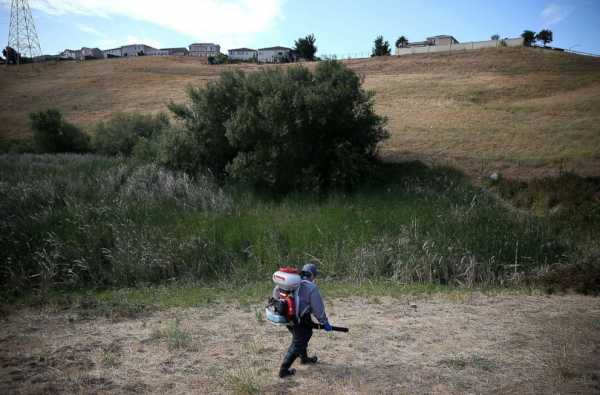
The Illinois Department of Public Health confirmed a West Nile diagnosis for a Chicago woman in her 60s, this week, and the California Department of Public Health confirmed four people with the virus last week. This is about a month earlier than the first case of the virus in 2017.
Mosquitoes may be more prevalent this year, due to a wet spring, followed by recent high temperatures, officials have said.

LM Otero/APMosquitoes are sorted at the Dallas County mosquito lab in Dallas, Aug. 16, 2012.
What is West Nile virus?
This virus, spreads to people by mosquitos, and can lead to a fatal illness in one out of 150 infected people, according to the U.S. Centers for Disease Control and Prevention. It is a seasonal epidemic in the U.S., with peak activity mid-August to early September.
In 2017, the CDC reported that 47 states confirmed a total of 2002 cases of West Nile virus.
Between 1999 and 2016, there were 46,000 cases confirmed in the U.S., and 2,000 related deaths, or four percent of all cases.
How is West Nile virus spread?
Mosquitoes become infected when they feed on infected birds. Infected mosquitoes then spread the virus to people and other animals by biting them.
West Nile Virus cannot be spread through coughing, sneezing, touching or simply by touching live animals. There is also no evidence that a person can get infected by handling infected birds, however health officials suggest gloves or an inverted plastic bag should be used to pick up a dead bird.

The Pantagraph/David Proeber via APCrows fly on the Illinois State University Quad at dusk, in Normal, Ill., Dec. 27, 2012. West Nile virus took a heavy toll in 2001, but since then they blackbirds have bounced back.
What are symptoms of West Nile?
Most infected people do not feel any symptoms. One in 5 infected people may develop a fever and other symptoms such as headache, body aches, joint pains, vomiting, diarrhea or rash. Symptoms generally begin within two to 15 days of acquiring the virus, according to the CDC. Most people recover completely, but fatigue and weakness can last for weeks or months.
In less than one percent of people, West Nile Virus can cause a serious, sometimes fatal, illness affecting the central nervous system or meningitis — an infection of the fluid that surrounds the brain and spinal cord. Symptoms of severe disease include disorientation, convulsions, muscle weakness, coma and paralysis.
People over 60 years old or with medical conditions like cancer, diabetes or high blood pressure are at greater risk of severe infection.
What is the diagnosis and treatment?
Anyone who has possible symptoms of West Nile Virus should be evaluated by a healthcare provider. Tests of the blood or cerebrospinal fluid can detect if the body is making a certain type of antibody because the virus is present.
There is no vaccine or antiviral treatment for West Nile virus, but most people recover completely on their own. Severe disease may require hospitalization, monitoring and supportive treatment.
Reducing the risk of infection
Preventing mosquito bites reduces the risk of contracting the virus. Applying insect repellent and wearing long-sleeved shirts and pants help.

Justin Sullivan/Getty ImagesContra Costa County Mosquito and Vector Control District technician Josefa Cabada uses a blower to distribute mosquito bacteria larvicide granules to kill off mosquito larvae found in a retention pond on July 21, 2015 in Bay Point, Calif.
The Environmental Protection Agency recommends using registered insect repellents, with one of the following ingredients: DEET, picaridin, IR3535, oil of lemon eucalyptus (OLE), oil of para-menthane-diol (PMD), or 2-undecanone. The agency has a tool on its website to help find the right repellent.
Community mosquito control programs also may spray insecticides to rapidly reduce the mosquito population during an outbreak or impending outbreak. Very small amounts of chemicals are used, which the EPA says should not cause health risks to people or pets, or long-term harm to the environment.
Sourse: abcnews.go.com
0.00 (0%) 0 votes


































